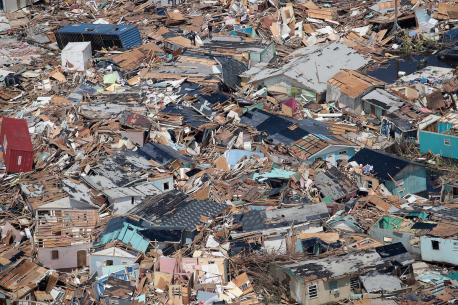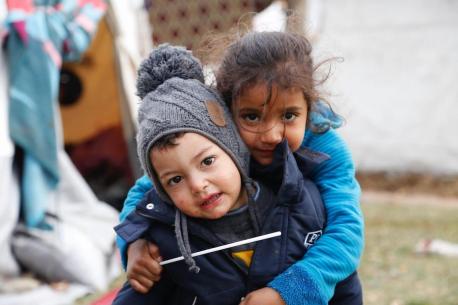
Hurricane Dorian Devastates the Bahamas and Bears Down on the U.S.
Communities are reeling in the aftermath of the storm, and those still in its path are bracing themselves for powerful winds and heavy rains. UNICEF is there to help families, as needed.
Hurricane Dorian, the strongest hurricane in Bahamas history, made landfall in the Bahamas on September 1, flooding neighborhoods, destroying homes and killing at least 30 people, with hundreds if not thousands missing. The toll is expected to rise significantly in the coming days.
In the meantime, UNICEF teams are working with the government and other United Nations agencies to ease the devastating impact on the tens of thousands of children and families whose homes and communities have been leveled. UNICEF water and sanitation experts along with emergency and child protection specialists are now on the ground in the Bahamas, assessing the needs and planning the response. According to the UN, an estimated 75,000 people urgently need food, water and shelter.
Aerial footage shows catastrophic devastation caused by Hurricane Dorian in the Bahamas’ Marsh Harbour and Great Abaco Island, as the storm flooded neighborhoods, flattened buildings and scattered boats. https://t.co/iAkS1v0FOppic.twitter.com/K19qZHzhBS
— ABC News (@ABC) September 4, 2019
After grazing the Florida coast as a Category 2 storm with 105 mph winds, Dorian also made landfall in Hatteras, North Carolina, with 90 mph maximum sustained winds. As rain, wind and storm surges buffeted the Carolinas, coastal communities all the way up to southeast Massachusetts prepared for torrential rain, life-threatening flash floods and high winds in the days ahead, according to the National Hurricane Center.
UNICEF USA has been in communication with local state Governments as well as partners on the ground to prepare for a potential response, if needed. Residents who may be in Dorian's path should monitor the storm's progress carefully and take immediate, appropriate precautions.

When Hurricane Maria struck the Caribbean in 2017, UNICEF quickly deployed staff and humanitarian supplies, including water purification tablets, tents and tarpaulins, school bags, Early Childhood Development kits, School-in-a-Box kits and teaching supplies, as well as hygiene and comfort kits for affected children and their families. © Manuel Moreno Gonzalez for UNICEF
As with our successful partnerships — with the City of Houston following Hurricane Harvey and in Puerto Rico after Hurricane Maria — UNICEF USA and local partners are standing ready to provide aid and comfort to meet UNICEF's core priorities: health, education, child protection and psychosocial support.
Across the globe, UNICEF responds where help is needed most. Last year, UNICEF responded to nearly 300 humanitarian emergencies in 90 countries.
With the world's largest humanitarian warehouse in Copenhagen, UNICEF can deploy supplies anywhere in the world in 48 to 72 hours to provide children with the clean, safe water, nutrition and protection they so desperately need when disaster strikes.
Please support UNICEF in getting emergency relief to those most in need all across the globe.
Top photo: An aerial view of damage caused by Hurricane Dorian is seen in Marsh Harbour on Great Abaco Island on September 4, 2019 in Great Abaco, Bahamas. A massive rescue effort is underway after Hurricane Dorian spent more than a day inching over the Bahamas, killing at least 20 and flattening entire communities. Photo by Scott Olson/Getty Images
HOW TO HELP
There are many ways to make a difference
War, famine, poverty, natural disasters — threats to the world's children keep coming. But UNICEF won't stop working to keep children healthy and safe.
UNICEF works in over 190 countries and territories — more places than any other children's organization. UNICEF has the world's largest humanitarian warehouse and, when disaster strikes, can get supplies almost anywhere within 72 hours. Constantly innovating, always advocating for a better world for children, UNICEF works to ensure that every child can grow up healthy, educated, protected and respected.
Would you like to help give all children the opportunity to reach their full potential? There are many ways to get involved.





